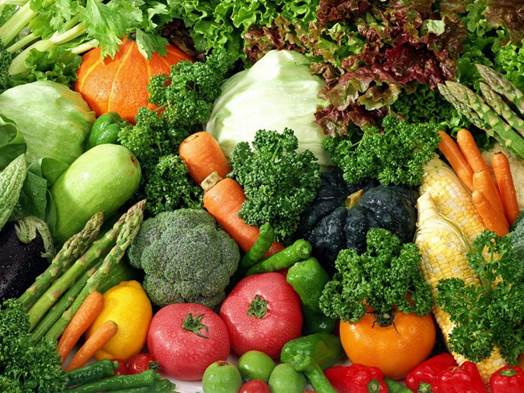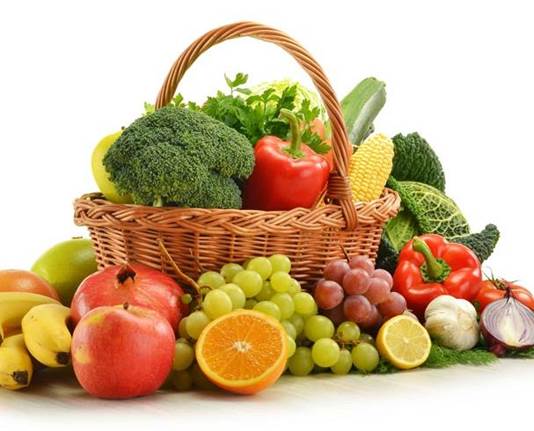We’d all love to look younger, but surgery
is no longer the answer for most British women, according to the latest
research. Images of celebs’ plastic surgery disasters, and fear of the risks
involved, means that over 50 per cent of women would say no to facelifts,
liposuction and tummy tucks, reveals one recent survey by professional hair
products retailer, Fabriah.com. Meanwhile, scientists are discovering that
piling your plate with specific nutrient-packed foods is one of the best
natural ways of achieving smoother, younger-looking skin.

Meanwhile,
scientists are discovering that piling your plate with specific nutrient-packed
foods is one of the best natural ways of achieving smoother, younger-looking
skin.
How Wrinkles Develop
Your skin is made up of multiple layers of
cells that constantly run through a cycle of shedding and regeneration, roughly
every 30 days. Aside from the natural ageing process, lines and wrinkles form
following a series of cellular changes that arise after oxidative damage,
caused by factors such as environmental pollutants, stress and UV rays.
Your diet also plays a central part in how
healthy and young your skin looks. Poor nutrition results in thinner skin,
reduced regeneration and an increase in cellular damage that leads to signs of
ageing. It also causes a reduction of the protein collagen, which plays a
critical role in supporting the structure of the skin and the skin’s
macromolecules such as hyaluronic acid (HA), commonly used in skin creams. HA
helps produce keratinocytes (a type of skin cell), which boost retinoic acid,
helping to promote new skin cells and better hydration. A fall in collagen and
HA causes more wrinkles and reduced skin elasticity.

Your
skin is made up of multiple layers of cells that constantly run through a cycle
of shedding and regeneration, roughly every 30 days.
Eat To Beat Ageing
To thwart signs of ageing, you need to
minimize factors that can accelerate the process, such as stress and sun
exposure, while nourishing your skin from within with the right foods. One of
the main skin nastiest is sugar. Sugary foods and drinks that disrupt blood
sugar levels not only contribute to inflammatory skin conditions, such as acne
and rosacea, but also wrinkles. When sugar comes into contact with collagen, a
process called Glycation occurs, which destroys collagen and compromises
regeneration of skin tissue. To avoid this, replace refined carbohydrates such
as white bread with wholegrain varieties, and aim to get more of your
carbohydrates from colorful vegetables, especially squash and sweet potato,
which is rich in skin-friendly nutrients such as beta-carotene.

aim
to get more of your carbohydrates from colorful vegetables, especially squash
and sweet potato, which is rich in skin-friendly nutrients such as beta-carotene.
Use natural sweeteners such as stevia or
xylitol rather than sugar and, when it comes to fruit, choose types with a
lower glycaemic index -for a slower sugar release, such as apples, berries,
citrus, pears and plums.
Omega-3 fatty acids are essential for
healthy skin, as they form an integral part of the cell membranes and help
prevent dehydration in the cells. This keeps your skin cells strong and full of
moisture, reducing the appearance of fine lines. The fats also have an
anti-inflammatory effect, which helps to calm irritated skin and gives you a
clear, smooth complexion. To get more beauty oils into your diet, eat more
olive oil, avocado, hemp, flaxseed, chia, borage oil, raw coconut oil and
omega-3s from oily fish.
Protein provides the building blocks of
collagen, which makes up approximately 75 per cent of the body’s skin. Collagen
fibers contain especially large amounts of the amino acids lysine and Proline,
so focus on sources such as skinless poultry, lean red meat and game, egg
whites, beans, pulses, soy and fish.
Protect Your Skin
Your skin needs good levels of protective
antioxidants to stave off ageing and protect it from the elements. Minerals
such as zinc, selenium and copper support the skin’s antioxidant defenses and
assist in collagen formation. Other skin-protective nutrients include coenzyme
Q10, cur cumin (found in turmeric), astaxanthin (found in salmon), vitamins E,
A, D, carotenoids including lycopene, and polyphenols including resveratrol found
in red wine, which you should drink in moderation, or risk dehydrating your
skin.
Try to boost your intake of polyphenol-rich
foods such as onions, cacao beans, grape seeds, tea, apple, citrus fruits,
berries, cherries and soy. To boost your intake of carotenoids, focus on
carrots, sweet potatoes, peppers, tomatoes, cantaloupe melon, mango, papaya,
broccoli and spinach. Other antioxidant protective foods include: nuts, seeds,
avocado, fish, shellfish and leafy green vegetables.
Higher intakes of collagen-boosting vitamin
C are associated with fewer wrinkles and softer skin. A powerful antioxidant,
vitamin C also quenches free radicals. To up your levels of vitamin C, load
your plate with citrus fruits, red pepper, tomatoes, green leafy vegetables,
berries, kiwi fruit and melon.

Higher
intakes of collagen-boosting vitamin C are associated with fewer wrinkles and
softer skin.
Biotin is another important nutrient for
glowing skin and a deficiency can result in inflammation. One of the best
sources of biotin is egg yolks, so include several eggs in your weekly diet.
Other good sources include Swiss chard, tomatoes, romaine lettuce and carrots.
Your skin is a major organ for the
elimination of waste. If your body is overloaded, excessive toxins can
accumulate, some of which are deposited on the skin in the form of pigments and
fats. Including foods to support your liver and digestive function helps keep
the skin glowing. Eat more cruciferous vegetables, beetroot, artichoke, berries
and yogurt. Avoid alcohol, caffeine, and processed, salty foods.